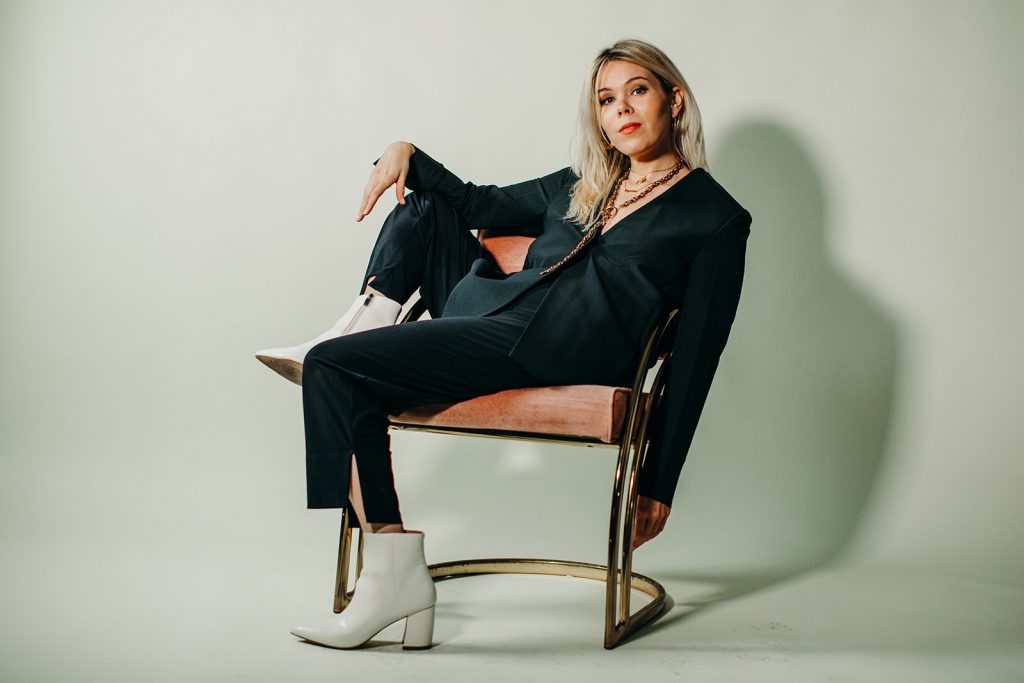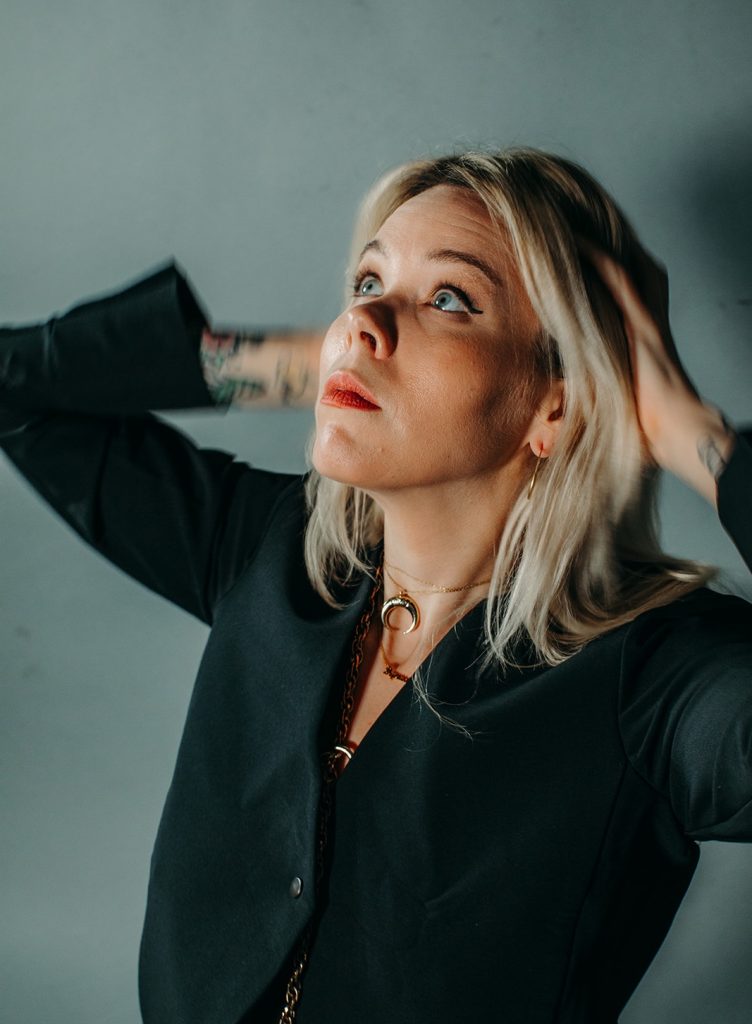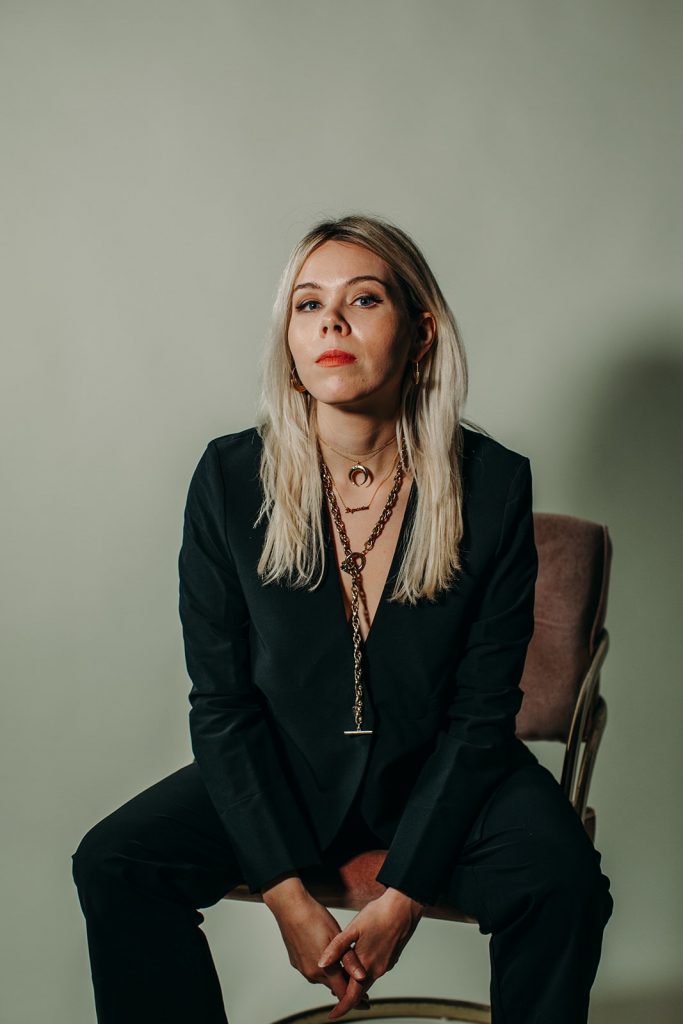Jaimee Harris Revisits Her Beginnings In New Song and EP
Exclusive: “Snow White Knuckles,” From Upcoming EP
By Mya Byrne, Staff Writer

Ed. – We’re great admirers of Jaimee Harris, and evidently the feeling’s mutual: Jaimee approached us offering an exclusive premiere of her new single, “Snow White Knuckles,” from her upcoming EP, The Congress House Sessions. Until February 19th, hear “Snow White Knuckles” at the bottom of this page.
Jaimee Harris is a restless artist. Her last record, Red Rescue, was hailed as one of the best Americana albums of 2018. On March 5th, Harris is releasing The Congress House Sessions, recorded with a team of her Austin friends at one of the most storied studios in Texas, with a guest appearance by underground legend Ray Bonneville.
This EP revisits many songs from Red Rescue in stripped-down arrangements reminiscent of MTV’s Unplugged – not a typical move for any songwriter these days. It’s a uniquely moving experience to engage with these songs in a new light, one that centers Harris’s incredible voice and guitar, with minimal – but highly effective – backing arrangements. We hopped on Zoom with Harris to talk about the EP
We’re thrilled that Jaimee chose CQ to premiere her next single, “Snow White Knuckles,” (at bottom), and sat down with us to talk about the EP. As you’ll see, we strayed into other topics as well.
I’m drawn to how you bluntly sing about the things you’re going through. I love your honesty, especially on a song like “Depressive State”, where you ask, “Will I ever be okay, and not someone that everyone hates?” How would you describe your songwriting process?
Always evolving and mysterious! I’ve never really felt like I was a great speaker. Then I was in a car wreck and got a brain injury, which made speaking a lot more difficult. I had to get stronger around speaking, but I think that the process of songwriting has been very healing.
It allows me to say things that maybe I wouldn’t in everyday conversation. I’m pretty open, but with depression, if someone asks me if I’m okay, most of the time I’d probably say “Sure,” or just not even pick up the phone; I can’t look at social media, or reply to texts or emails. So to put it in a song helps me understand my own experience, and being able to sing that on stage is really powerful. What some people who don’t write songs might not understand is that as a songwriter, you still have the power of a narrator. Yes, the narrator might be me, but this is a narrator. So I get to control the ending in a song.
Well, I say I’m in control. Really, I’m not; I have the illusion of being in control, but really I feel like there’s something mysterious working through me that ends up on the page. But if I approach it as “the narrator” it gives me a little more freedom to dig all the way down.
My song mentor, the late Jack Hardy, always said, “Never let the truth get in the way of a good song.”
I’ve heard that wisdom! It’s been passed down to me from many songwriters who were also mentored by Jack. I love it.
I’m glad to hear that! What’s the story behind this EP?
Because it is so stripped back I’ve been asked, “Is it a pandemic record?” I actually recorded it in February 2020. One of the inspirations for making it was touring as a solo act. Red Rescue is this giant wall of sound, which is very cool. But I went from playing with a seven-piece band in Austin to being alone on stage with an acoustic guitar.
I got a deal with a label in the Netherlands. It’s ironic because I had a full-on breakdown while we were on tour there two years ago; I was really struggling. I felt very alone, because here I was with these amazing opportunities; I’d just quit my day job, on the road opening for an act that was selling out rooms all over the country, and it was amazing. I had an extreme amount of gratitude for those experiences, but I felt like I wasn’t nailing it. Like “Oh my gosh, after all this time, I’m still not ready.” Or, “Oh, I can’t believe I’m thrown in here with just myself.”
Ever since I started playing, I was in a duo or trios. I hadn’t really developed that solo skill set. But here I was, solo, on these amazing stages. I couldn’t shine the light on someone that just played an awesome solo or fade into one song from the next. That was a hard thing to reckon with! So I decided, “Well, all I have is my acoustic guitar and my voice. I’m going to learn how to sing out more.” That’s another reason why I wanted to capture these songs in this way, where I really feel like I’m at the center of them. They’re more developed with my guitar playing. I had to get better at it because that’s all I had to work with on a stage! And so the result of that was that I got the deal, and they decided to release this acoustic EP, despite the pandemic.

So, “Snow White Knuckles.” Why this single and why right now?
To me, “Snow White Knuckles” feels like the first Jaimee Harris song I ever wrote. I’ve been writing since I was 14, but I wrote this right after I got sober. I know a lot of people right now are struggling with being isolated, feeling like there’s a brick wall you can’t break through. So to introduce this acoustic, intimate record, this song felt exactly right, because it feels like so much of my story as a songwriter—so much of my story as a human being.
It hit me pretty hard, especially lines like “I never thought I’d draw a sober breath / I always thought I’d be a wreck / Always figured I’d have nothing left.” I resonate with it as an artist, and as a person in recovery with depression. Can you elaborate on how this song fits into your story?
In Austin, there was this 24-hour coffee shop / venue [Strange Brew]. I hung out there a lot. It turns out that a lot of sober musicians did too, and they kind of crept into my life right before I got sober. There was a gospel brunch there every Sunday morning. So it was four songwriters, a bunch of guests, a drummer, and they would play anything that they felt was “gospel”. They called it “spiritual music for nondenominational folks”; Staples Singers songs, Townes Van Zandt’s “Heavenly Houseboat Blues,” whatever fit. And they asked me to come sit in and sing. And I remember the first time I played “Snow White Knuckles” there. My band came out of that, and the first group of real fans that I felt like I had; before that I was in a hipster scene, whichwasn’t me. Like, I’m cool in like a nerdy “I like pinball and rollercoasters” kinda way…
My kinda cool!
Ha! So I was like, “Where are the people that listen to Patty Griffin, Townes? I’m in Austin; they have to be here!” And that was at Strange Brew. It all feels like it came from the song. And of course, you know, having a renewed sense of life getting sober.

I admire how God-forward “Snow White Knuckles” is—earnest, but non-denominational, not proselytizing. It’s very much in the zeitgeist of queer country. The narrator talks of a personal relationship with God in a very specific way, and when I heard it, I feel like I heard you; like you were speaking to me, telling me who you were.
Thank you for saying that. I grew up in Waco, Texas, which tries to fight Nashville as being the buckle of the Bible Belt. I learned to sing in the Baptist church, like many country and folk singers. My grandmother was one of the first women deacons at the First Baptist Church of Waco, which I didn’t realize at the time was kind of a big deal!
I grew up with this faith, but it was always my choice. My mother is an angel; she did say, “It would make me really happy if you would go to church with me on Sundays,” but it was never forced on me. She’s a great living example of loving your neighbors, accepting people as they are, the good parts of Christianity.
And as I began recovery, because of my mother and my relationship with art—there’s something way beyond me that happens when I’m writing; I know Julia Cameron calls it “the great creator”—I was ready to believe that something had my back, but that it wasn’t going to do all the work. It wasn’t this God that was going to take an eraser and clean the slate off. It was, “All right, I want to put people in your path that can help you. And I’m going to give you some tools and you gotta run with it.” And I hope that comes through.
I think it does. How was the record produced?
I met [producer] Mark Hallman at parties in Austin, and we’d be those two people that talk to each other in the corner. I had no idea that he was behind all these Eliza Gilkyson records that I love, and worked with Carole King, Ani DiFranco… He was just a guy that I talked to at parties!
We started working together when I was still living there. I would sing background vocals on records he was producing. I wanted an opportunity to work with Mark and to record at The Congress House, because these records that I loved were made there. It felt like something I had to do for my soul journey.
We decided to do it campfire-style. Kris Nelson and Jane Ellen Bryant, who sang harmonies, were both my roommates for a while. So we literally sat around the kitchen table or the backyard and sang harmonies together. Sammy Powell, who plays keys on the record, is in a rock band that I sing with sometimes called Western Youth, and Brian Patterson and I met at church in Hewitt, Texas many years ago. And he’s been in my band as a guitar player. Jane and Chris and I cut the songs in one day, in no more than two takes. Then Sammy came in and played a little piano with Brian; they played off of each other. So while it’s a very sparsely produced record, it feels like all of those personalities came together and infused it with love.
Then my friend Ray Bonneville stopped in to have lunch and ended up playing harmonica on “Red Rescue.” I thought that that was beautiful, because my friend and mentor Jimmy LaFave, who sang harmonies on the first version of the record, had passed away. Jimmy and I used to go to the diner together late at night; we’re both night people. And Ray used to go, too. After Jimmy died, Ray and I started hanging out; we started going to the diner together and became close. It feels like the whole thing is a campfire infused with a lot of friendship.
It sounds that way. What are your hopes for it?
I just like to make the art and hope the people that need to hear these songs have that chance. I don’t like to think too much about what’s going to happen. I work really hard to make sure that I listen to the song—that the song tells me what it wants to be. When it comes time to put that into a recorded form, I just want to honor the songs the best that I can. And then I have to trust that if I did that, if we all did our jobs and brought our best to it, that whatever is going to happen is going to happen. They’re going to land on the people that need to hear them. And that might sound a little woo-woo. But that’s my belief.
I live in California. You can woo-woo all you want. Free crystals with every EP!
Ha! That’s a great idea. Missed a huge opportunity there.
“Snow White Knuckles”
The Congress House Sessions will be available on March 5 on all services. Pre-save the EP here. “Snow White Knuckles” goes live on February 19th.